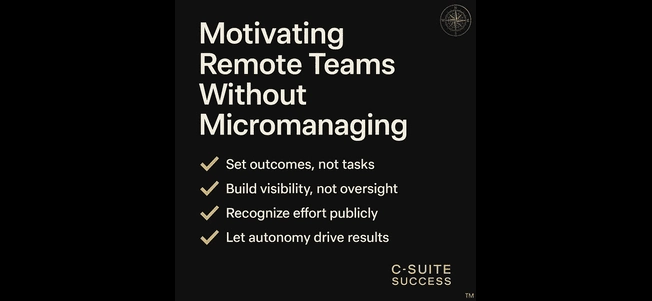Motivating Remote Teams Without Micromanaging

-
Motivating Remote Teams Without Micromanaging
- 🔑 1. Set Outcomes, Not Tasks
- 🧠 2. Give Ownership and Trust the Process
- 🎯 3. Replace Oversight with Visibility
- 🏆 4. Recognize Effort Publicly and Often
- 🤝 5. Make Time for Human Connection
- Final Word: Motivation Is a System, Not a Speech
Disclosure: Some of the links in this article may be affiliate links, which can provide compensation to me at no cost to you if you decide to purchase. This site is not intended to provide financial, medical, or legal advice and is for entertainment only.
Motivating Remote Teams Without Micromanaging
In 2025, the best remote teams move fast, think independently, and perform with purpose. But how do you motivate people without watching over their shoulders?
Micromanagement kills trust and initiative—especially in virtual environments. At C-Suite Success, we help leaders master remote motivation by building systems of autonomy, accountability, and recognition. Here’s what actually works:
🔑 1. Set Outcomes, Not Tasks
High-performers want to know why their work matters. Ditch the to-do list and define clear, measurable outcomes. Replace “check in” meetings with “progress against goals” discussions.
✅ Pro tip: Use tools like Monday.com to align goals and let teams self-manage how they get there.
🧠 2. Give Ownership and Trust the Process
When leaders obsess over how work is done, they suffocate creativity. Set direction, provide resources, then step back. Let teams choose their approach and ask for help when needed.
✅ Pro tip: Use Loom to record context once, then let your team run with it asynchronously.
🎯 3. Replace Oversight with Visibility
Micromanagement often comes from lack of visibility. Create systems that allow team members to show progress—without daily hand-holding.
✅ Pro tip: Implement a weekly ritual (e.g., “Monday Wins” via Slack or Motion) for everyone to share key wins and priorities.
🏆 4. Recognize Effort Publicly and Often
Recognition fuels motivation. It reminds your team that their work matters. In remote settings, you must be intentional about this—it won’t happen casually in the hallway.
✅ Pro tip: Build a culture of “shout-outs” using tools like Slack, Kudos, or quick async video notes.
🤝 5. Make Time for Human Connection
Motivation isn’t just about work—it’s about belonging. Schedule non-work moments like virtual coffee chats, shared Spotify playlists, or even fun polls in your team channel.
✅ Pro tip: Leaders should model this by showing up authentically—your tone sets the tone.
Final Word: Motivation Is a System, Not a Speech
If you're still motivating through motivational speeches or status updates, you're falling behind. In remote teams, motivation comes from clarity, autonomy, recognition, and connection.
Don’t micromanage. Engineer motivation.
-
Motivating Remote Teams Without Micromanaging
- 🔑 1. Set Outcomes, Not Tasks
- 🧠 2. Give Ownership and Trust the Process
- 🎯 3. Replace Oversight with Visibility
- 🏆 4. Recognize Effort Publicly and Often
- 🤝 5. Make Time for Human Connection
- Final Word: Motivation Is a System, Not a Speech
Disclosure: Some of the links in this article may be affiliate links, which can provide compensation to me at no cost to you if you decide to purchase. This site is not intended to provide financial, medical, or legal advice and is for entertainment only.
